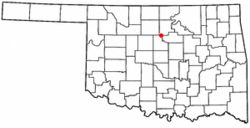Orlando, Oklahoma facts for kids
Quick facts for kids
Orlando, Oklahoma
|
|
|---|---|

Location of Orlando, Oklahoma
|
|
| Country | United States |
| State | Oklahoma |
| Counties | Logan, Payne |
| Area | |
| • Total | 0.39 sq mi (1.01 km2) |
| • Land | 0.39 sq mi (1.01 km2) |
| • Water | 0.00 sq mi (0.00 km2) |
| Elevation | 1,089 ft (332 m) |
| Population
(2020)
|
|
| • Total | 130 |
| • Density | 331.63/sq mi (128.12/km2) |
| Time zone | UTC-6 (Central (CST)) |
| • Summer (DST) | UTC-5 (CDT) |
| ZIP code |
73073
|
| Area code(s) | 580 |
| FIPS code | 40-56050 |
| GNIS feature ID | 2413091 |
Orlando is a small town located in Logan and Payne counties in the U.S. state of Oklahoma. In 2020, about 130 people lived there. It is part of the larger Oklahoma City area.
History of Orlando
Before Orlando became a town, this area was known as Cherokee. The name was changed to Orlando when a post office opened on July 18, 1889.
Early Orlando had some interesting events. In 1892, a person named Oliver Yantis, who was part of a group called the Doolin Gang, was caught near town and later passed away in Orlando. In 1896, some people tried to trick others by pretending there was gold nearby. This caused a "gold rush" where some townspeople lost money before the trick was discovered. In 1902, a tragic fire started from unsafe lamp fuel, leading to the loss of a woman and two children, and damaging several homes.
A strong tornado hit Orlando in 1927, sadly causing two deaths and destroying many houses. In the 1930s, when Lake Carl Blackwell was built, about 100 families who often visited Orlando for trade had to move away.
After World War II ended, passenger trains stopped coming through Orlando. Later, when Interstate 35 was built in 1964, the town lost much of its road traffic, which affected its businesses.
Geography of Orlando
Orlando is located about 21 miles (34 km) north of Guthrie, which is the county seat of Logan County. It is also about 1 mile (1.6 km) west of the Payne County line and 1 mile (1.6 km) south of the Noble County line.
According to the United States Census Bureau, the town covers a total area of about 0.2 square miles (0.52 square kilometers). All of this area is land.
Population Facts
Orlando's population has changed over the years:
| Historical population | |||
|---|---|---|---|
| Census | Pop. | %± | |
| 1900 | 300 | — | |
| 1910 | 340 | 13.3% | |
| 1920 | 161 | −52.6% | |
| 1930 | 226 | 40.4% | |
| 1940 | 332 | 46.9% | |
| 1950 | 262 | −21.1% | |
| 1960 | 194 | −26.0% | |
| 1970 | 202 | 4.1% | |
| 1980 | 218 | 7.9% | |
| 1990 | 198 | −9.2% | |
| 2000 | 201 | 1.5% | |
| 2010 | 148 | −26.4% | |
| 2020 | 130 | −12.2% | |
| U.S. Decennial Census | |||
In 2000, there were 201 people living in Orlando. The town had 74 households, and 52 of these were families. About 34% of the households had children under 18 living with them. The average age of people in Orlando was 32 years old.
See also
 In Spanish: Orlando (Oklahoma) para niños
In Spanish: Orlando (Oklahoma) para niños
 | Ernest Everett Just |
 | Mary Jackson |
 | Emmett Chappelle |
 | Marie Maynard Daly |

